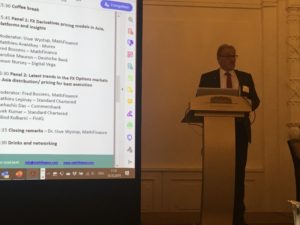Editorial
First MathFinance Asia Conference in Singapore
MathFinance Asia successfully hosted its 1st conference in Singapore at the Fullerton Hotel on 18th October 2019. The conference was well attended, with many attendees from over several regional and internationally active financial institutions as well as global platform and service providers being represented. This one of a kind event specially focussed on the area of FX derivatives and their applications in the financial industry.
The kick-off was provided by Dr. Michiel Haasbroek, CRO of ABN AMRO, Greater China, who led us through his views on the current geopolitical scenario, current trends and the different currencies that are competing with the dominance of the US Dollar in international trade. Some of the key statements included:
- The top 5 largest banks are in Asia.
- Asset growth in the region is well over 4%, the highest being 12% in Vietnam (excluding Japan).
- Fastest growing banks in the world in terms of asset accumulation.
- High growth of need for banking products.
- Area of greatest savings globally.
- The APAC region has large amounts of liquidity available, particularly in Japan.
As for the currencies, Michiel concluded that the U.S. dollar will continue to play the major role, as it is simply hard to replace.

In the more technical keynote, I discussed the SLV class of models, the history behind its development and their application across certain FX exotic products. We still find vanna-volga users in the market, more so in the area of valuation. Market makers’ electronic trading platforms tend to use SLV variations and its extensions. Mixed-Local volatility models are considered a fast alternative to SLV for first generation exotics without explicit dependence on the term structure of volatility.
In the subsequent panel discussions, we focussed on the trends and insights in the FX derivatives industry including the use of multi-dealer platforms as well as the use of certain financial models in the financial industry and the uniqueness of trading derivatives in certain currency pairs. The interesting question came up whether SLV models have become the market standard simply because everybody else is using it. Our panellists clarified that SLV isn’t enough, particularly, jump models are required for pegged currencies such as USD-HKD, as otherwise even SLV models would just generate random numbers instead of option prices conform to the market. Furthermore, they agreed that for exotics traders with human intelligence (HI) are still required, whereas spot trading has already been set to auto-pilot mode using clever algorithms and artificial intelligence (AI). However, voice trading is moved more and more to trading platforms. The good old rule to use the platform as a price indicator and then call the trader to get a better price is changing: now bugging the trader with an individual request will cost the client more than trading over the platform.
Our panelists have also witnessed an evolution in the demands in the last couple of years, that the role of FX derivatives in wealth management has substantially increased, compared to the traditional role of a hedging asset class for corporate treasurers. This in turn requires a streamlined margin calculation for any products traded on margined accounts, such as accumulators and target forwards.

For the distribution of FX derivatives, the upcoming trend is seen in optimizing distribution channels, multi-dealer platforms with tradability. We have already come a long way, now being able to design and trade FX target forwards with a smart phone. Big software providers with many users face the challenge that any upgrades and features to a risk management system must be thoroughly tested and made available to all the users. This is where smaller vendors may still have a head start in their speed of adapting their software.
Thanks to all the attendees of our first annual MathFinance Asia conference in Singapore for their engaging participation.

Special thanks to our panelists and speakers: Michiel Haasbroek, Matthieu Avanthey, Caroline Mauron, Simon Nursey, Mathieu Lepinay, Snehashis Das, Vivek Kumar, Milind Kulkarni, Frédéric Bossens for making our inaugural Asia event a platform for the FX Options and Structured Products community.
Following the resounding success of this inaugural conference MathFinance is looking forward to hosting the second edition next year in Singapore. We will announce more details in our Newsletters.
Uwe Wystup
Managing Director of MathFinance
Upcoming Events
FX Options & Structured Products
6th – 7th November 2019
Dubai, UAE
Trainer: Uwe Wystup
UAE FMA is organizing FX Options and Structured Products course to get in-depth knowledge of FX and have a full understanding of which FX-linked structured products are commonly traded.
Participants will be equipped with the deep knowledge and skills related to, FX Structured Products in Wealth Management, Structured Products Litigation in FX/IR markets, and FX Structured Products for Corporates, FX Market Data and Smile construction in the light of comprehensive example, simulation exercises and case studies.
Check here for all details
FX Options for Professionals
27th – 28th November 2019
Warsaw, Poland
Trainer: Uwe Wystup
This advanced practical two-day course covers the pricing, hedging and application of FX exotics for use in trading, risk management, financial engineering and structured products. It is presented by Prof. Dr. Uwe Wystup.
FX options are becoming increasingly commonplace in today’s capital markets. The objective of this workshop is to develop a solid understanding of the current currency derivatives used in international treasury management. This will give participants the mathematical and practical background necessary to deal with all the products on the market. We will do live exercises in the course, so delegates should bring their laptops with Excel/VBA or python installed.
See the sample videos here.
This course is for
- Quants / Financial Engineers: to learn how the products are used
- Traders: to deepen the technical background
- Risk Managers: to understand the front-office way of thinking
- Structurers: to learn more about pricing and models
- Researchers: to understand the practical matters
- Sales People: to get the overview of product development and smile adjustments
- Buy-Side / Treasurers: to understand the sell-side and find the best hedging policy
This advanced course is meant for all those, who are already dedicated to capital markets and need to deepen their knowledge of currency options. Understanding the FX vanilla options market and FX smile however, is essential to understand exotics.
Click here for details
Winter School of Mathematical Finance
The 19th Winter school on Mathematical Finance will be held in Lunteren, The Netherlands, on January 20 – 22, 2020. The special topics are Dealing with Market Frictions and Hedging in Markets with Price Impact.
Minicourses will be delivered by
Peter Bank (Technische Universität Berlin) and Bruno Bouchard (Université Paris-Dauphine).
Special invited lectures by
René Aïd (Université Paris-Dauphine)
Martin Keller-Ressel (Technische Universität Dresden)
Vladimir Piterbarg (NatWest Markets).
Four short lectures complete the programme. For more information and registration see
https://staff.fnwi.uva.nl/p.j.c.spreij/winterschool/winterschool.html
Open Positions
Tenure Track Faculty in Mathematical Finance or Optimization at Carnegie Mellon University
The Department of Mathematical Sciences at Carnegie Mellon University invites applications for a tenure-track faculty position, to begin September 1, 2020. The position is in mathematical finance or optimization, and the rank is open.
Preference will be given to candidates who have shown outstanding promise and/or excellent accomplishments in research, and are pursuing a vigorous research program including major contributions beyond the doctoral dissertation. Promise of excellent ability to teach and mentor students of diverse backgrounds is a plus.
The Department has long-standing strength in mathematical finance and plays a central role in Carnegie Mellon’s interdisciplinary masters and bachelors degree programs in computational finance. The Department also has a popular undergraduate degree concentration in Operations Research, and interest in graduate level courses in optimization is growing. Candidates for this position are expected to be able to contribute to one or more of these educational programs.
Applications should be submitted by October 31, 2019 for full consideration.
The Department of Mathematical Sciences is committed to increasing the diversity of our faculty. Carnegie Mellon considers applicants for employment without regard to, and does not discriminate on the basis of, gender, race, protected veteran status, disability, sexual orientation, gender identity, and any additional legally protected status.
Applicants should submit materials electronically at www.mathjobs.org and https://apply.interfolio.com/69158. This includes a cover letter, curriculum vita, list of publications, a statement describing research interests, and at least three letters of recommendation (including at least one that specifically addresses teaching). Letters of recommendation will be solicited through mathjobs only. Recommenders who are unable to submit their letters electronically may mail them to: Tenure Track Search Committee, Department of Mathematical Sciences, Carnegie Mellon University, Pittsburgh, PA 15213.
Applications may be accepted and reviewed until any open positions are filled.
=====================================================================
Post Doctoral Appointments in stochastic analysis/financial mathematics at Carnegie Mellon University
The Department of Mathematical Sciences plans to make multiple two-or three-year post-doctoral appointments in stochastic analysis, with at least one appointment being in financial mathematics, beginning in September 2020.
Preference will be given to candidates who have shown outstanding promise and/or excellent accomplishments in research. A PhD in mathematics or a closely related discipline is required.
The Department of Mathematical Sciences is committed to increasing the diversity of our faculty. Carnegie Mellon considers applicants for employment without regard to, and does not discriminate on the basis of, gender, race, protected veteran status, disability, sexual orientation, gender identity, and any additional legally protected status.
Applicants should submit all materials electronically through mathjobs and https://apply.interfolio.com/69829. This includes a curriculum vita, a list of publications, a statement describing current and planned research, and at least three letters of recommendation (including at least one that specifically addresses teaching). Letters of recommendation will be solicited through mathjobs only. Recommenders who are unable to submit their letters electronically may mail them to: Stochastic Analysis Postdoc Search, Department of Mathematical Sciences, Carnegie Mellon University, Pittsburgh, PA 15213.
For full consideration, applications should be submitted by December 2, 2019. Applications may be accepted and reviewed until any available positions are filled.
